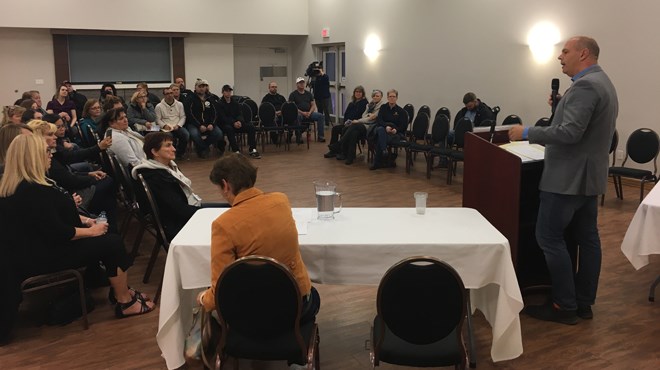It has been 20 weeks since CarePartners Sudbury employees were locked out and the services they provide taken over by a central office in Southern Ontario.
If you've driven through the intersection at Notre Dame Avenue and Ste. Anne Road near the Rainbow Centre between June and now, you've likely seen a contingent of CarePartners workers holding United Steelworkers Local 2020 signs and calling for their employer to get back to the bargaining table.
The group met Thursday night at the USW hall on Brady Street and were joined by Nickel Belt MPP France Gélinas, Sudbury MPP Jamie West, and Nickel Belt NDP candidate Stef Paquette.
A town hall meeting of about three dozen people took place inside the hall, with the local politicians showing their support for the locked out workers.
Employees affected by the lockout are not the frontline PSWs who provide home care to those who need it, but rather the administrative staff who schedule the PSWs and coordinate home visits for not just Sudburians, but those in need of home care all across Northern Ontario. The scheduling of appointments is being done from Southern Ontario, creating new problems.
"Even just in Nickel Belt we have hundreds of residents feeling the effects of this lockout," said Gélinas. "Having these visits being scheduled by people who don't live here, who don't know the area, it's created confusion and a poor quality of care."
A specific area where quality of care needs are not being met are in the French speaking community. While CarePartners does have bilingual PSWs, the people in charge of scheduling these workers aren't aware of who they are, nor do they know which clients may require their service in French.
"We have a high contingency of French speaking people in Nickel Belt and certainly the care coordinator who is doing the job isn't aware," said Gélinas.
"A lot of people who reach out to me are people with family members who have dementia and when you have different people coming to give you care every time because the scheduler doesn't know that Capreol and Coniston are not next to one another, you end up with very poor quality care and sometimes the patient will refuse care because they don't know those people who are coming into their home."
Speed of service has been another issue with moving the scheduling out of Sudbury; both clients requiring home care and PSWs use the same service when home visits are being coordinated.
CarePartners PSW Julie Southwell attended Thursday's town hall meeting and said that while things have slowly been getting better over the 20 week lockout, there's still noticeable shortcomings.
"I'd start by saying my patients' biggest complaint is being on hold for a very long time, same with me being on hold sometimes up to nine or 10 minutes," said Southwell.
"When I need to do a call, or my patients need a call, they're being left on hold for a long time."
More than the inconvenience of spending time waiting on hold when there are patients that require service, Southwell says the biggest issue she has with the entire situation is the apparent lack of respect that CarePartners has for its employees.
"This shows me, that if they're willing to treat them (administrative staff) that way, am I just a number too? How am I supposed to take that?" said Southwell. "Morally, it's hard for me to stick with a company that was willing to throw them under the bus like this, after all the work they've done."
CarePartners is one of the main providers of home care in Sudbury, and CarePartners schedulers have been without a collective agreement since March 31. The deal tabled by CarePartners to its employees was "concession-laden" and "unacceptable," according to Mike Scott, staff representative with the United Steelworkers Local 2020 back in early June when employees were first locked out.
Jessica Montgomery is unit president at CarePartners Sudbury and has been working for the company for seven years. Montgomery was there when the company transitioned from the non-profit sector to the for-profit model it now operates under.
"When we rejected the company's final offer we were awaiting our next set of negotiating days, however the company didn't respond to the union and decided to lock out the employees, then flipped the switch and sent the work down south," said Montgomery.
"The deal offered was full of concessions, it didn't address major workplace concerns such as bullying and harassment, it didn't include fair and decent wage increases."
CarePartners Sudbury acts as the central hub of scheduling for Northern Ontario, scheduling home care visits as far as Thunder Bay, Sault Ste. Marie, Elliot Lake and North Bay.
"When you get someone from Toronto who can't speak French, which a requirement of our job is to be bilingual, they have issues addressing major health concerns and our PSWs are then forced to work with inconsistencies and our clients aren't getting the continuity of care," said Montgomery.
With a rift in the lines of communication and a struggle to maintain a consistent level of service, the risk increases for the lockout to have a ripple effect and impacting other sectors of the health care industry.
"When home care fails, these people end up at HSN," said Gélinas. "We all know how overcrowded HSN is, and this is a direct contribution to this. A lot of people of people that should have been cared for in their own homes are not receiving quality home care and are ending up in hospital."
